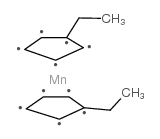101923-26-6
| 中文名 | 二(乙基环戊二烯基)锰(II) |
|---|---|
| 英文名 | 2-ethylcyclopenta-1,3-diene,manganese(2+) |
| 中文别名 |
双(乙基环戊二烯基)锰
双(乙基环戊二烯基)锰(II) |
| 英文别名 |
Manganocene,1,1'-diethyl
1,1'-Diethylmanganocene MFCD01862452 |
| 沸点 | ~80ºC(lit.) |
|---|---|
| 分子式 | C14H18Mn |
| 分子量 | 241.23100 |
| 闪点 | 230 °F |
| 精确质量 | 241.07900 |
| LogP | 3.60340 |
| 储存条件 | 密封储存,储存于阴凉、干燥的库房。远离热源,火花,火焰。常用氮气保护。 |
| 稳定性 | 常温常压下稳定,避免与空气,水分,强氧化剂接触。 |
| 分子结构 | 1、摩尔折射率:无可用的 2、摩尔体积(cm3/mol):无可用的 3、等张比容(90.2K):无可用的 4、表面张力(dyne/cm):无可用的 5、介电常数:无可用的 6、极化率(10-24cm3):无可用的 7、单一同位素质量:241.0789 Da 8、标称质量:241 Da 9、平均质量:241.2308 Da |
| 计算化学 | 1、 疏水参数计算参考值(XlogP): 2、 氢键供体数量:0 3、 氢键受体数量:8 4、 可旋转化学键数量:2 5、 互变异构体数量: 6、 拓扑分子极性表面积(TPSA):0 7、 重原子数量:15 8、 表面电荷:-8 9、 复杂度:250 10、同位素原子数量:0 11、确定原子立构中心数量:0 12、不确定原子立构中心数量:0 13、确定化学键立构中心数量:0 14、不确定化学键立构中心数量:0 15、共价键单元数量:3 |
| 更多 | 1. 性状:液体 2. 密度(g/mL,20℃):未确定 3. 相对蒸汽密度(g/mL,空气=1):未确定 4. 熔点(ºC):未确定 5. 沸点(ºC,常压):80 6. 沸点(ºC,1.5mmHg):未确定 7. 折射率(n20/D):未确定 8. 闪点(ºC):110 9. 比旋光度(º):未确定 10. 自燃点或引燃温度(ºC):未确定 11. 蒸气压(mmHg,20ºC):未确定 12. 饱和蒸气压(kPa,25ºC):未确定 13. 燃烧热(KJ/mol):未确定 14. 临界温度(ºC):未确定 15. 临界压力(KPa):未确定 16. 油水(辛醇/水)分配系数的对数值:未确定 17. 爆炸上限(%,V/V):未确定 18. 爆炸下限(%,V/V):未确定 19. 溶解性:未确定 |
|
Section 1: Product Identification Bis(ethylcyclopentadienyl)manganese, min. 98%, 25-0210, contained in 50 ml Swagelok® cylinder (96-1070) Chemical Name: for CVD/ALD CAS Registry Number:101923-26-6 Formula:[(C2H5)C5H4]2Mn EINECS Number:none
Chemical Family:metallocene Synonym:none Section 2: Composition and Information on Ingredients IngredientCAS NumberPercentACGIH (TWA)OSHA (PEL) Title compound101923-26-6100%0.2mg/m3 (as Mn)5mg/m3 (as Mn- Section 3: Hazards Identification May be irritating to, skin, eyes and mucous membranes. May be harmful if swallowed. Some manganese Emergency Overview: compounds are known to affect the central nervous system. Possible risk of irreversible effects. Primary Routes of Exposure:Inhalation and ingestion Eye Contact:May cause slight to mild irritation of the eyes. Skin Contact:May cause slight to mild irritation of the skin. Vapor or mist may be irritating to the nose, mucous membranes and respiratory tract. May cause chronic Inhalation: health problems. Ingestion:No information available on the physiological effects of ingestion. May be harmful if swallowed. Acute Health Affects:May be irritaitng to the nose, mucous membranes and respiratory tract. Prolonged exposure to manganese containing vapor or mist may produce manganese pneumonitis and Chronic Health Affects:manganese poisoning. Symptoms include sleepiness, weakness and emotional disturbances. Equivocal studies have shown manganese may decrease fertility in men. Possible risk of irreversible effects. NTP:No IARC:No OSHA:No SECTION 4: First Aid Measures Immediately flush the eyes with copious amounts of water for at least 10-15 minutes. A victim may need Eye Exposure: assistance in keeping their eye lids open. Get immediate medical attention. Wash the affected area with water. Remove contaminated clothes if necessary. Seek medical assistance if Skin Exposure: irritation persists. Remove the victim to fresh air. Closely monitor the victim for signs of respiratory problems, such as difficulty Inhalation: in breathing, coughing, wheezing, or pain. In such cases seek immediate medical assistance. Seek medical attention immediately. Keep the victim calm. Give the victim water (only if conscious). Induce Ingestion: vomiting only if directed by medical personnel. SECTION 5: Fire Fighting Measures Flash Point:no data Autoignition Temperature:no data Explosion Limits:no data Extinguishing Medium:carbon dioxide, foam or dry powder If this product is involved in a fire, fire fighters should be equipped with a NIOSH approved positive pressure Special Fire Fighting Procedures: self-contained breathing apparatus and full protective clothing. Hazardous Combustion andIf involved in a fire, this material may emit toxic and corrosive fumes. Decomposion Products: Unusual Fire or Explosion Hazards: Highly flammable. Formation of explosive air/dust mixtures is possible. SECTION 6: Accidental Release Measures Small spills can be mixed with vermiculite, sodium carbonate or other suitable non-combustible adsorbent and Spill and Leak Procedures: swept up. SECTION 7: Handling and Storage Handle and store the material under an inert atmosphere of nitrogen or argon. Keep in a cool, dry Handling and Storage: well-ventilated area. Prolongrd exposure to air or moisture will result in degradation of the product. SECTION 8: Exposure Controls and Personal Protection Eye Protection:Always wear approved safety glasses when handling a chemical substance in the laboratory. Skin Protection:Wear protective clothing and gloves. Ventilation:Handle the material in an efficient fume hood. If ventilation is not available a respirator should be worn. The use of respirators requires a Respirator Respirator: Protection Program to be in compliance with 29 CFR 1910.134. Ventilation:Handle the material in an efficient fume hood. Additional Protection:No additional protection required. SECTION 9: Physical and Chemical Properties Color and Form:dark red liq. Molecular Weight:241.23 Melting Point:not applicable Boiling Point:no data Vapor Pressure:0.1 torr @ 50-65° Specific Gravity:no data Odor:none Solubility in Water:reacts with water SECTION 10: Stability and Reactivity Stability:air sensitive, moisture sensitive Hazardous Polymerization:no hazardous polymerization contact with moisture and oxygen. Keep away from heat and ignition sources including open flame and Conditions to Avoid: electostatic discharge. Incompatibility:air, oxidizing agents, halogens, protoc agents Decomposition Products:Carbon dioxide, carbon monoxide, organic fumes and manganese oxide. SECTION 11: Toxicological Information RTECS Data:No information available from the RTECS files. Carcinogenic Effects:no data Mutagenic Effects:Possible mutagen (as Mn) Tetratogenic Effects:no data SECTION 12: Ecological Information Ecological Information:No information available. SECTION 13: Disposal Considerations Disposal:Dispose of this material according to local, state and federal regulations. SECTION 14: Transportation Shipping Name (CFR):Flammable solids, Organic, N.O.S. Hazard Class (CFR):4.1 Additional Hazard Class (CFR):NA Packaging Group (CFR):II UN ID Number (CFR):UN# 1325 Shipping Name (IATA):Flammable solid, Organic, N.O.S. Hazard Class (IATA):4.1 Additional Hazard Class (IATA):NA Packaging Group (IATA):II UN ID Number (IATA):UN# 1325 SECTION 15: Regulatory Information TSCA:Not listed in the TSCA inventory SARA (Title 313):See Category code N450 for reporting Second Ingredient:none SECTION 16 - ADDITIONAL INFORMATION N/A |
| 危害码 (欧洲) | F: Flammable;Xi: Irritant; |
|---|---|
| 风险声明 (欧洲) | R17 |
| 安全声明 (欧洲) | 26 |
| 危险品运输编码 | UN 3392 4.2/PG 1 |


